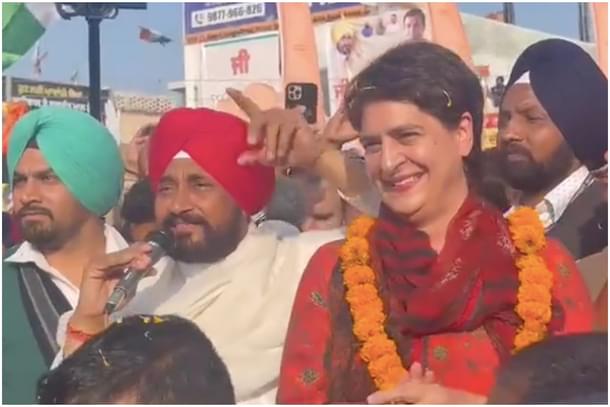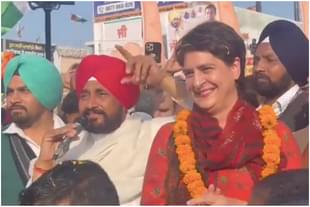Politics
Congress’ ‘Bhaiyya’ Comment: Symbol Of Party’s Politics, Symptom Of A Larger Malaise in Punjab
Rohit Pathania
Feb 17, 2022, 07:56 PM | Updated 07:56 PM IST
Save & read from anywhere!
Bookmark stories for easy access on any device or the Swarajya app.


It is no surprise that Prime Minister Narendra Modi criticized Punjab Chief Minister Charanjit Singh Channi for his rather distasteful remarks on ‘bhaiyyas’ from UP and Bihar. It was also heartening to see PM Modi remind people that the tenth Sikh guru, Guru Gobind Singh ji and Guru Ravidas ji Maharaj (who is revered by lakhs of Punjabi Dalits), both came from the Purabiya lands of Patna and Varanasi.
Can we expect anything better from the Congress party though?
The party and its leaders have always tried playing to the gallery, even if it meant ugly sloganeering and petty jibes at others.
Alpesh Thakore spewed bile against Bihari labourers in Gujarat, inciting violence. Erstwhile Delhi Chief Minister Sheila Dikshit had said that Bihar and UP migrants created pressure on the city state. The Congress’ own MLA in Karnataka had passed comments about the complexion of a former chief minister of the state. They also keep company with such ‘social justice warriors’ as the DMK, whose minister in Tamil Nadu called Biharis as people with ‘less brains’.
They all perhaps took after under Rahul Gandhi, the scion of Congress, who specialises in such remarks, going by his near-xenophobic comments coming out repeatedly. Be it the tasteless 'north-south' comparison of politics or the shocker about not allowing Gujaratis entry into Assam, there is nothing that the man does not get away with, thanks to the media darlings who want to ‘launch’ him ever so often.
Is it any surprise then that Mr Channi’s comments came in the presence of his sister, Priyanka Gandhi Vadra?
Bhaiyyas, the Soft Targets in Punjab
Politics apart though, there was a rather parochial and classist element about Punjab’s present society that surfaced, albeit briefly, in the national discourse. This element, the disdain for the bhaiyyas of UP and Bihar, particularly in Punjab, rarely gets seen, though it has been prevalent for long, and it merely needs a scratch on the surface for it to become evident.
It is evident in the movies where they are seen as superstitious rickshaw drivers in cities. It is obvious in the songs that make fun of their eating habits or their ‘attitude’ towards their landlords after getting fed up of torture. Beatings from the ‘maalik’ are seen as passe, and the frail bodies are a butt of excessive jokes.
Be it agricultural or industrial activity within Punjab, the presence of the ‘bhaiyyas’ of UP and Bihar has been a boon for the state. They are everything the Punjabis can be – industrious, hard-working, and away from controversy.
The only difference between migrants from UP, Bihar and migrants from Punjab is perhaps that the former are legal residents in their place of work, whereas a significant section of Punjab’s youth would risk illegality in the quest of a better life abroad, a fact documented multiple times.
But for the bhaiyyas, the state could not even move an inch, as was discovered during the lockdown. Many industries were even compelled to fly down the workers who had for UP/Bihar during the lockdown, even as Ministers promised ration for them.
The bhaiyyas have always been a soft target. Last year in April, the Ministry of Home Affairs ticked off the Punjab government for inaction on protecting the migrants. As a report in the Hindu had pointed out,
“…labourers from Uttar Pradesh and Bihar who work in agricultural fields in the State are drugged, exploited and meted out inhuman treatment….The Ministry said that 58 mentally challenged people from Bihar and Uttar Pradesh were found working as bonded labourers in the border districts of the State by the Border Security Force (BSF) in 2019 and 2020.”
It is not that the people aren’t fighting this. There are non-governmental organizations in Punjab that have been fighting such treatment to workers and are going out of their way to tackle this challenge. However, they are hampered by social attitudes prevalent in the gentry of the state, who could not care less about these ‘kaale bhaiyye’, one of the variations of the pejorative term.
But such a situation isn’t new. People seem to have forgotten how this sentiment has carried on with certain sections of society. As Sandeep Deo, a famous Hindi author and journalist who covered Punjab for some time pointed out today on Twitter, one of the first major incidents of terrorism in Punjab pertained to murder in daylight of Bihari migrant labourers in Jalandhar on the footpath outside Jalandhar radio.
Cut to 2004, and little had changed even then. The 2004 Punjab Human Development Report prepared by United Nations Development Programme had prepared a special chapter on migrants and had noted a few pointers that deserve mention, for they persist even today.
The first wave of migrants came following the Green Revolution, which led to huge demand for farm hands as families became incapable of handling huge volumes of manual labour. Today however, the migrants meet the demand for factory hands and provide other services needed in industrial belts.
As the report had poignantly stated, “The migrant labourer is considered an ‘outsider’ in a cultural, linguistic and class sense, the focus is always on ‘the migrant as a problem’, rather than the ‘problems of the migrant’.” They get employed mostly in low-paid unskilled jobs that often carry greater health hazards than other jobs, with wages lower than those for ‘locals’.
Apology in the Absence of Justice is a Sham
Mr Channi has already released a video in an attempt to defend himself. However, in light of the discrimination faced by the people of UP and Bihar in Punjab on a daily basis, no amount of word salads can address what these people face.
This is further accentuated by the absence of a justice system to address their concerns, which is frequently on display. As was seen in the case of labourer Raju Singh, the police acted on the complaints of the local landlord of keeping Raju’s family ‘hostage’ only after local media shamed them into action. Similar was the case of 63 bonded labourers of two brick kilns, where an NGO’s intervention in the Punjab and Haryana High Court compelled the administration to act. These among a flurry of recent instances raise questions on the dystopia that the state has created for itself, where there is big talk of humanity accompanied by indifference to such horror stories.
Meanwhile, a party like the Congress continues to pedal on, with zero accountability for its divisive politics. For its allies in the media, even a muted criticism of the party hides an ugly wart of a stark reality of today’s Punjab.
Rohit Pathania works in the space of renewable energy and environment. Other interests include politics and the economy.





